
views
Controlling Your Thoughts
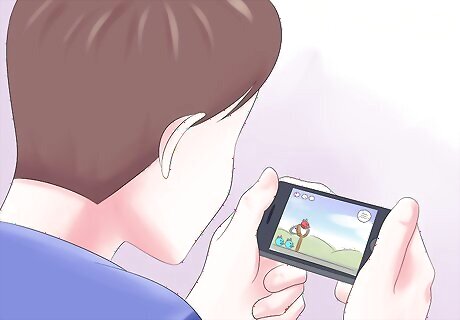
Remove your distractions. The most basic thing you can do to help you concentrate in class is to get away from the distractions that are keeping you from focusing. There are lots of things that might be taking your attention away from the lesson. Try to be more aware of what you’re doing when you stop paying attention. Once you know what it is, you can find a way to get rid of it. Distractions include items like a computer, a phone, and small items that you can play with. Distractions also include things that are around you, like a friend, an annoying classmate, or a window. Physical removal is the best way to deal with a distraction. So, for example, if you know a classmate is distracting you. Try sitting somewhere else. Your teacher will understand and will probably be more than happy to help you move seats.

Focus on the present. You have to try to keep your brain from wandering out of the classroom. No daydreaming! Keep your mind here, in the present and save thoughts about other stuff for later. This is hard to do but if you can make the change, it will really help you a lot. Things you might catch yourself thinking about include: games, what you’re doing after school, your boyfriend or girlfriend (or lack thereof!), your friends, your family...even fantasy stuff like books you'd like to read or places you wish you could go. You’ll have to learn to manually refocus your attention. Catch yourself and then make yourself think about the lesson again. Eventually it becomes a habit and you learn to daydream less. This means that even if you’re thinking about another aspect of the class, like the test you have coming up, you’ll want to stop and refocus on what’s happening right now. It’s important to do things like think about tests but if your mind is wandering then you’re not absorbing the information that you need to learn at the moment.
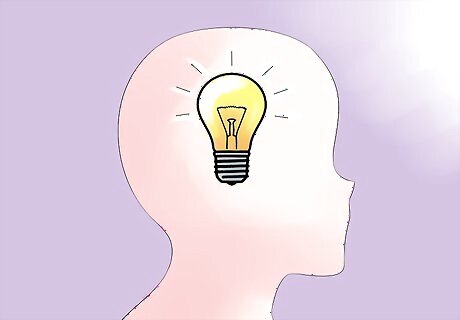
Refocus your attention as necessary. Pay attention to what your mind is doing. If you catch yourself thinking about anything other than what’s currently happening in the lesson then you’re going to have to manually refocus your attention. Try saying back everything that your teachers says in your own head and really emphasizing the important bits. One thing you might want to practice is building your ability to focus. Test yourself by trying to do a challenging task while listening to loud, distracting music. Focus is a skill which needs to be exercised and developed, just like any other.

Talk to your teacher about classes. Everyone learns in different ways. The way your teacher teaches may not be the best way for you or there may be ways to make class even better for you. Set aside some time to talk to your teacher about ways they think might help you get more out of your class. Try making customized lessons or assignments that are more interesting for you to learn. You can also ask your teacher for extra credit or side projects which help you learn the same lessons but in a way that works better for you. If you're serious about learning and you're willing to put in hard work, your teacher will probably be willing to help you come up with something.

Create your own motivation. When you're more motivated, you'll find you have an easier time staying focused. Of course, if your teacher and your class can't or won't make you more motivated, you'll have to work to create that motivation for yourself. This can be frustrating but it'll be worth it: you'll get the benefits of education, whether people want to help you along or not. There are lots of ways to make yourself motivated and interested in learning and what you do will depend on who you are. You can try finding some aspect of the subject that is interesting to you. This can make the rest of the class more interesting because you'll feel more like you're building a base for the stuff that you want to learn. For example, maybe you don't really like your history class but you do like medieval knights. You can try to imagine how all of the history that you are learning ties back to medieval knights, and you'll find that that makes it easier to focus on what you're learning.
Changing Your Actions

Prepare before class. Sometimes you just need to be in the right mindset before you can pay attention. Before class starts, try looking over your homework, reading from your textbook, or looking at the previous day's notes. This can get your brain into "class mode", so that you can have an easier time focusing. Preparing yourself by getting everything that you'll need and arranging your desk can also help you focus. This will cut down on distractions, like needing to borrow a pencil because yours is out of lead.
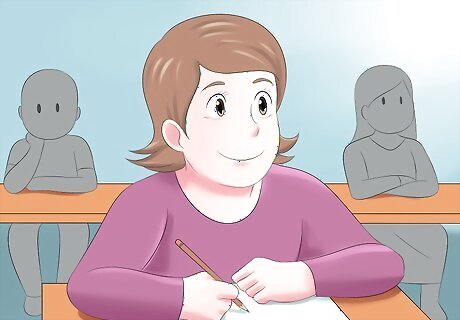
Find a better environment. By changing your environment, or the things around you, you can actually really help yourself concentrate. This doesn't just mean getting rid of distractions, although that can certainly help too. Just sitting in a different spot may help you focus by changing what you can do from where you sit. Sitting in the front, for example, can help you focus because you'll know the teacher is watching you. Sitting away from your friends can also help, because you won't be physically able to talk with them as much.
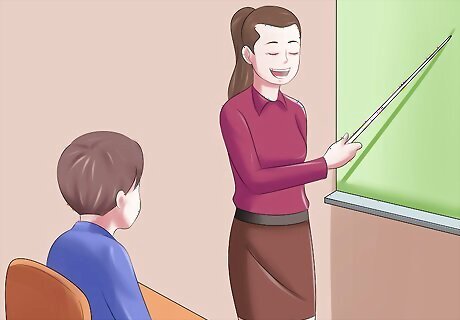
Participate in class. Participating in class can also help you focus. Participation keeps your mind engaged and focused on the lesson because you can't just drift off or think about something else. Anything you can do to participate, from asking questions to getting in to group projects or discussions, can really help you. Ask questions. A good way to participate in class is to ask questions. When you have a question about something you don't understand or the teacher said something and you want to know more about it, raise your hand and ask. Even just focusing enough to listen for things you might want to ask questions about can help you pay way more attention.
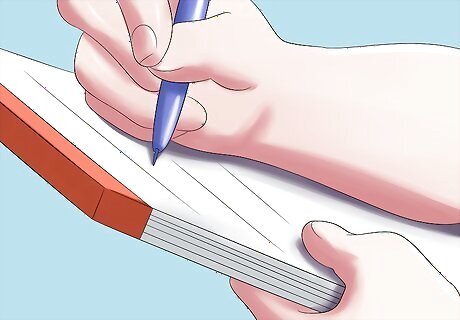
Take notes. Taking notes can help you focus on what your teacher is saying, even if you don't think you'll need the notes to study from later. If you can use the notes then even better! As your teacher talks, make an outline with a few side notes on the really complex topics. You'll find yourself focusing better before you know it. If you don't know how to take notes, we've got you covered!
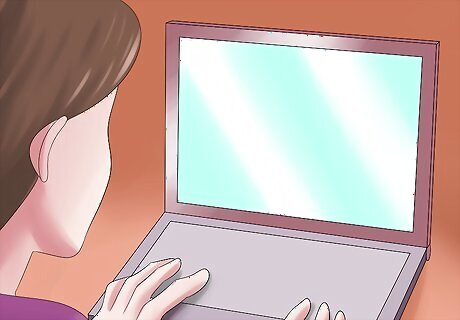
Do extra research. Sometimes you lose focus in class because you can't understand what your teacher is saying. This is normal and understandable. If you do extra research so that you can better understand your lessons, you might have an easier time paying attention. At the very least, learning outside of class can make up for the fact that you're having a hard time paying attention. You can find more information on just about any subject in various places online. You can even get some subject help from wikiHow. For example, if you're struggling with math, try going to Math is Fun or Wolfram Alpha to get more math help.

Develop a routine. Not paying attention really is a bad habit. Just like any other habit, you can break it by replacing it with other habits. Try to create a system where you focus in class, making that time just for school and learning, but give yourself times of relief where you can have lots of fun. By teaching your brain what time of the day is for what by sticking to a routine, you can train your brain to pay attention.
Priming Your Body

Get enough sleep. Sleep is incredibly important for staying focused while you’re at school. If you stay up too much or if you sleep in a way that doesn't fully rest your brain, there’s basically nothing you can do to stay focused during the day. Take a hard look at your sleep schedule and see if there are any changes you can make. For anyone under 12 years old, doctors recommend about 10 hours of sleep. For anyone older, eight or nine hours of sleep is recommended. However, some people need more sleep and some people need less. You’ll have to experiment. Keep in mind that oversleeping can also make you tired. You might be sleeping too much, if you increase your sleep and still feel tired halfway through the day.

Eat right to maintain your brain. If you don’t eat enough food, or if you miss out on essential nutrients for too long, your brain will start to suffer. Much like not getting enough sleep, if you don’t eat right or enough then there’s not much you can do to help yourself concentrate. Take a look at your diet and decide if you need to adjust how you eat. You need to get lots of veggies, a little fruit, healthy whole grains, and plenty of lean proteins. Good options include: kale, broccoli, spinach, apples, citrus fruits, bananas, brown rice, quinoa, oatmeal, fish, chicken without skin, and turkey. Avoid caffeine or at least use it carefully. Caffeine can help some people focus but for others it makes them too jittery to pay attention to anything for very long. You also risk a caffeine crash.
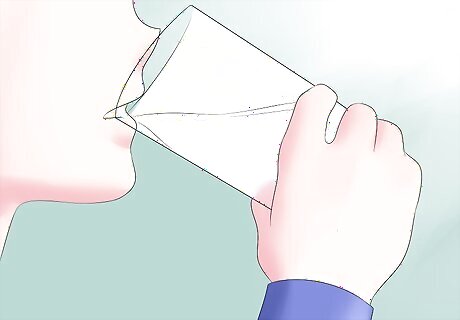
Drink plenty of water. Your body needs lots of water to function properly. When you don’t drink enough, you’ll end up with headaches and problems focusing. How much is enough will depend on your particular body; everyone is different. However, a good way to gauge if you’re drinking enough water is to take a look at your pee. If it’s pale, you’re drinking enough. If it’s dark, bring on the hydration. Drinking actual water is a good idea here. Soda, commercial juice, and milk are all not very good for you and the sugar in the soda and juice can actually make your problems focusing even worse.
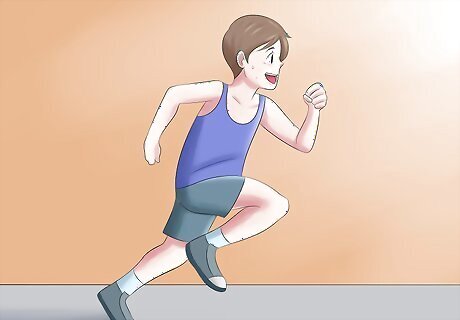
Exercise to relieve tension. Some people are very physical. Their bodies need a lot more activity to be happy. It also just takes a lot of concentration to pay attention in class and this can get your brain and body all wound up. If you find yourself feeling antsy in class, try to get some physical activity in between classes or during your breaks. This can help calm your body and brain down so that you can focus. It can also help you wake up if you're feeling tired. Try jumping up and down or running in place. You can also jog around the building or play a game with your friends if you have the time.
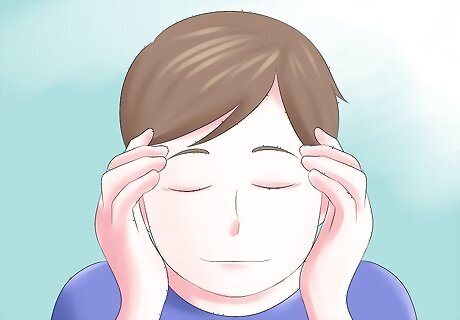
Practice paying attention. Paying attention takes practice. That’s just how it is. Your brain is like a muscle and it needs to be exercised to make it strong in the areas where you want it to work well. You’ll have to practice paying attention if you want to increase your ability to pay attention. One good way to practice is actually to meditate. Sit and try to empty your mind while focusing only on one simple thing, like breathing in and out from your nose.

















Comments
0 comment